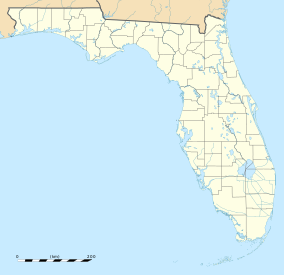| Judah P. Benjamin Confederate Memorial at Gamble Plantation Historic State Park | |
|---|---|
 | |
| Location | Ellenton, Florida, USA |
| Coordinates | 27°32′N 82°32′W / 27.533°N 82.533°W |
| Governing body | Florida Department of Environmental Protection |
Robert Gamble House | |
| Built | 1845–1850 |
| Architectural style | Greek Revival Vernacular |
| NRHP reference No. | 70000189[1] |
| Added to NRHP | August 12, 1970 |
The Judah P. Benjamin Confederate Memorial at Gamble Plantation Historic State Park, also known as the Gamble Mansion or Gamble Plantation, is a Florida State Park, located in Ellenton, Florida, on 37th Avenue East and US 301. It is home to the Florida Division United Daughters of the Confederacy (UDC).
The park consists of the antebellum mansion developed by its first owner, Major Robert Gamble; a 40,000-gallon cistern to provide the household with fresh water; and 16 acres (65,000 m2) of the former sugarcane plantation. At its peak, the forced-labor farm included 3,500 acres, and Gamble likely enslaved more than 200 people to work the property and process the sugarcane.
The mansion was listed on the National Register of Historic Places as the Robert Gamble House on August 12, 1970. Its columns and two-foot-thick walls are constructed of tabby, a regional material developed as a substitute for brick.
The park also includes the restored wood-frame, two-story, Victorian-style Patten House, built in 1872 for owner George Patten.
In 1925, the mansion and grounds were purchased by the United Daughters of the Confederacy and donated to the state as a memorial to Judah P. Benjamin, who served in three Cabinet positions under Confederate President Jefferson Davis during the American Civil War. He stayed at the plantation in May 1865, before fleeing from the Union forces and sailing to England, where he had a second career.
The Gamble Mansion serves as home to the Florida Division UDC.[2] In 1937, the UDC installed a memorial plaque to Benjamin at the mansion. Also on the grounds is the Confederate Veterans Memorial Monument, erected October 10, 1937.[3]
In 2002, the State of Florida acquired the property that holds the ruins of the plantation's sugar mill, one of the South's largest, and added it to the historic park complex.
On April 18, 2012, the AIA's Florida Chapter placed the Gamble Mansion #76 on its list, Florida Architecture: 100 Years. 100 Places.[4]
- ^ "National Register Information System". National Register of Historic Places. National Park Service. July 9, 2010.
- ^ "Gamble Plantation - Florida Division UDC". Archived from the original on April 26, 2017. Retrieved April 26, 2017.
- ^ Confederate Monument Archived 2017-04-26 at the Wayback Machine Florida Public Archaeology Network
- ^ "AIA FLORIDA TOP 100 BUILDINGS 1912—2012". American Institute of Architects. 2012. Retrieved March 12, 2023.

